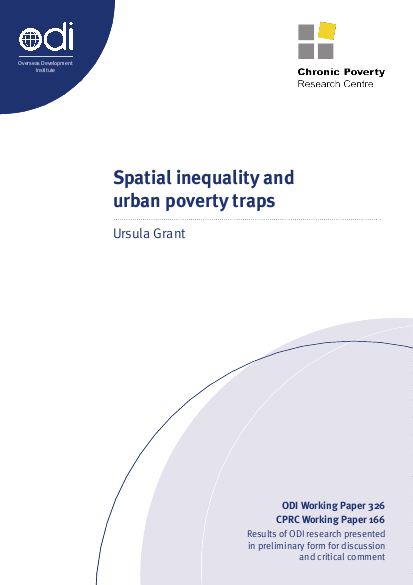
This paper demonstrates how urban spatial poverty traps exist in developing countries and makes the case for including an urban focus to spatial poverty analysis and policy responses. It frames this within a discussion of rapid urbanisation currently occurring in many developing country contexts and the concurrent rise in urban poverty and urban inequality. The paper argues that inadequate attention has been paid to urban spatial poverty traps but that, in light of the current trends (urbanisation and rising urban poverty), there is a clear need to improve understanding of and policy responses to them. The paper argues that spatial inequality in urban areas is based on more than physical proximity to services, infrastructure and jobs. Rather, it is linked to the development over time of distinct areas of urban deprivation that undermines the benefits of physical proximity that urban residence may offer. The paper argues that social analysis and micro-level analysis are critical in the urban context. It presents a framework that combines geography and social dynamics to show how spatial poverty traps exist in urban areas. The paper then provides a series of examples and experiences of urban spatial poverty traps in developing countries. It examines possible neighbourhood effects in creating these poverty traps and draws an overarching framework that links geography, social relations and chronic poverty. Examples are provided from the urban inner city, the peri-urban periphery, small towns and refugee centres. More hidden forms of urban poverty (e.g. homelessness) are also discussed, before a series of policy issues and challenges are raised. The paper discusses the direct investment choices and governance shifts necessary for combating spatial inequality. It concludes that a shift is required in policymaking processes to incorporate both geographical analysis and social analysis for more strategic and equitable urban development.
Resource collections
- UN Habitat - Urban Response Collection
- Urban Response - Urban Crisis Preparedness and Risk Reduction
- Urban Response Collection - Community Engagement and Social Cohesion
- Urban Response Collection - Economic Recovery
- Urban Response Collection - Environment and Climate Change
- Urban Response Collection - Housing, Land and Property
- Urban Response Collection - Urban Crisis Response, Recovery and Reconstruction
- Urban Response Collection - Urban Resilience